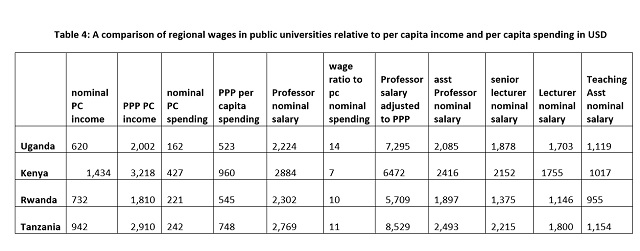

The other way to judge whether lecturers at Makerere are poorly paid is to compare their wages with those of lecturers in public universities in our neighboring east African nations of Kenya, Tanzania and Rwanda. To ensure that we are comparing like for like, I have adjusted these wages to US dollars and then adjusted the US$ to Purchasing Power Parity (PPP). I have also provided figures of per capita income and per capita spending in each of these countries in order.
Table 4 shows that Makerere lecturers are paid more in relative terms (if you factor in per capita income and per capita spending) than their counterparts in the region. For example they earn 14 times more than our nation’s per capita spending in nominal dollars compared to their counterparts in Kenya who earn 7 times, Rwanda 10 times and Tanzania 11 times. To be fair to Makerere lecturers, I have adjusted this to PPP and Uganda and Rwanda pay their lecturers 4.2 times their per capita spending while Kenya is 3.0 times and Tanzania 3.7 times.

Finally I have stretched this argument and compared the pay of Makerere lecturers with the average pay of lecturers in the United States, the world’s richest nation. Table 6 shows the average salaries of US lecturers from professors downwards. While the average wage of a tenured professor in America is $95,224 that of his counterpart at Makerere University is $26,689. To compare like for like, I have adjusted Makerere wages to PPP in order to reflect their actual purchasing power in an international currency. The salary of a professor at Makerere when adjusted to PPP comes to $87,540. Effectively, Makerere in a country with a per capita income of $2003 in PPP pays its professors almost the same wage as universities in America with a per capita income of $56,000 pay their professors, a ridiculous thing.
We are living in an age where bluster and belligerence have become substitutes for analysis. It is an age when inconvenient facts are rejected out of hand and where the subtext of political debate is that to arrive at a policy conclusion one should follow the angriest voices on the street rather than facts established through empirical inquiry or scientific research. It is also an age where for one to identify themselves with the “masses of suffering Ugandans” one must embrace voices of the angry even when they are wrong. If you disagree with the angry view, it is not because you have a different view but you have been “compromised by the regime” and are therefore complicit in what is perceived as “a system of oppression”.
This situation has forced many journalists and commentators to constantly embrace the socially approved single story that the government in Uganda is evil and that everyone who disagrees with it is virtuous and has a point. Increasingly therefore, public policy debates in Uganda have come to reflect a toxic combination of high emotion and little knowledge. In fact a culture has grown and consolidated in Uganda’s public debate that is hostile to facts, that rejects reference to scientifically generated and unbiased data in favor of anger and intuition. However, we should remember that righteous anger is never a basis for good policy.
This lesson sunk into me over time as I began to take research seriously. When governments make policy in response to public anger it is often bad policy. I began writing this article to demonstrate that Uganda pays its lecturers poorly. But the facts I found changed my view to the opposite. This has happened to me on many issues where I previously would have allowed my biases and prejudices to cloud my judgment.
This realization that my initial biases were wrong made me feel good because it has consistently released me from partisan anger. And once I was no longer angry, I was no longer committed to reaching the conclusion that righteous anger demands i.e. deluding myself that I am virtuous and government officials are evil. In the case of Makerere University, it is not government in the wrong but lecturers who see themselves as special hence and keep demanding a disproportionate share of the national budget.
****
amwenda@independent.co.ug
 The Independent Uganda: You get the Truth we Pay the Price
The Independent Uganda: You get the Truth we Pay the Price



“The lecturers strike at Makerere also could be seen as unfair for another reason. Currently, the university has total enrolment of 39,546 students of whom only 6,324 are sponsored by government. This means that 33,222 students are self-sponsored i.e. their parents, guardians or themselves pay fees from which 23.4% of lecturers’ salaries are paid. To refuse to teach when privately sponsored students constitute 84% of the total student population is unfair.”
In my view, the unfairness of the lecturers to teach should not have been compounded with an even more arbitrary measure by Government to close the university. If security was the problem, the state has the capacity to ensure security of the property and lives both within and outside the University.
The university should have remained open to the 84% private students to enable them access the library for research and continue to benefit from the other amenities like accommodation, meals and etc that they have equally paid for. Even the 16% public sponsored students could have been advised to retain the university for library research as Govt sorts out its responsibilities to its staff. All decisions that the Leadership of Makerere made were with the blessing of the Mother Ministry and all avenues thus existed to solve the problem before it escalated to the point it did. A government loses appearance of control if its perennially in fire-fighting mode.
In a world of advanced e-learning, lecturers form a dying breed of academicians. What the students paid for and desired above all were the facilities and environment to study and research. If government needed to close down anything, it could have suspended its sponsorship program of the 16% Govt aided students so that the incentives package of the lecturers fits within the budget supported by revenues collected from student tuition.
That way it would be left to the public to determine the level of service that the ruling party is offering and whether its in line, or not, with their aspirations as voters and stakeholders; unless off course the state sought to thwart a larger threat with political connotations…
1.Makerere University staff & those from other Public universities are among the top 10 well paid Ugandans. They know this but they are just big headed most graduates are applying to be office attendants coz they are paid 800k they hide their degree transcripts & strategically submit their O’level during interviews.
2. The university was closed coz of big headedness on the part of both students & staff we had to deflate their heads abit.
3.It would be better to have 2 categories of permanent staff i.e those employed to teach govt students & those to teach private students otherwise the fees collected from private sponsored students is seen as mana from heaven.( i am told each lecturer has a calculator to compute fees collected from private students that’s why their appetite for cash is high)
4.Most Ugandans believe that govt should be bullied into submission whether they work or not actually, most staff at MUK are on sabbatical leave they get full salary from MUK and abroad.(isnt this abuse of office?)
5.The economy class of planes departing from Entebbe is filled to capacity with lecturers traveling to present papers abroad you wonder when they teach.
6.There is a craze for all lecturers to have PhD’s they are actually getting PhDs haphazardly through staff development Commitees will the aim of “catching” the 15m M7 promised .
7. The Title Assoc.Prof or Prof is so simple to obtain especially in the humanities field of study. One just needs to attend conferences even if its in Kasese then paid someone to vet your publications then you are good to go.
8.I find it so funny that most civil servants will serve the nation for over 40 years with a low pay without quitting what does this mean?it means that most civil servants cant be employeed in reputable institutions coz of their bad manners & poor working ethics.
9.Ugandans are found of using govt institutions as a stepping stone for their selfish interest and they are not ashamed to do so e.g Govt funded the studies of Godber Tumushabe ,Onyango & Nuwagaba Justus but they are our biggest critics they charge govt for advise they have forgotten that govt is the biggest marketing manager of all ugandans abroad.
10.Dr.Nyanzi Stella undressed coz of the money.
But, in case you are in New York City, it is
really not possible for many to get a bag for $1,000.
Since most branded merchandise is highly priced, we need to seek out other
ideal and smart ways to enjoy the good thing about them.
There are even diaper bags which do not even seem like diaper bags from your outside.